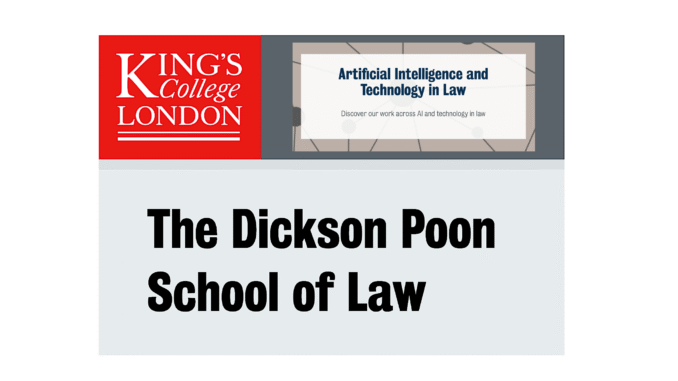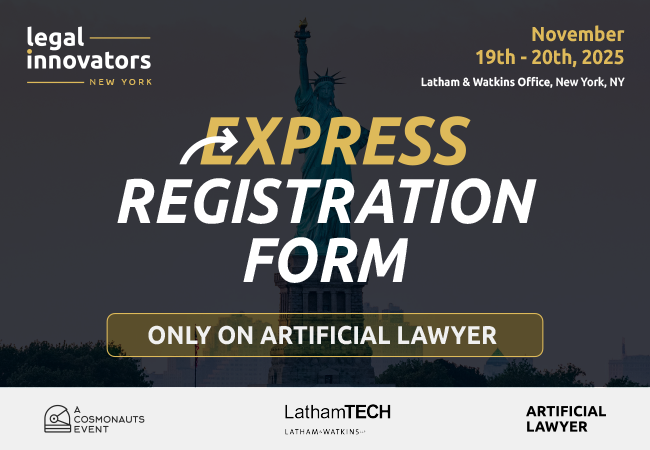
The Dickson Poon School of Law at King’s College London has announced a pioneering AI Literacy Programme, giving every law student and staff member free access to legal AI tools such as Legora, Harvey, Luminance, and Lucio AI, alongside a 12-week online course and weekly workshops. (See AL Interview with Professor Dan Hunter below on this and legal AI + education more broadly.)
The initiative, led by Hunter, who is Executive Dean of the Law School, and a well-known legal AI expert, told Artificial Lawyer that this course was different to others across legal academia: ‘None [of the others] have customised AI literacy courses for all their students. And none run by their dean who happens to be an AI & law expert.’
The programme, which commences in January, will give ‘every student and staff member hands-on access and structured guidance….ensuring that King’s graduates will lead the legal profession’s AI future,’ he added.
Alex Fortescue-Webb, Head of Legal Engineering at Legora, commented: ‘We’re especially excited to work with King’s innovative Legal Clinic. By integrating our platform into clinical work, students will see first-hand how responsible AI can enhance real-world legal service and access to justice.’
John Haddock, Chief Business Officer at Harvey, added: ‘Expanding the Harvey Law School Program to the UK and partnering with The Dickson Poon School of Law at King’s College London to give all law students access to Harvey’s platform is an incredibly exciting step for us. We will work closely with faculty to offer student workshops, curriculum embeds, and collaborative projects that explore AI’s role in law and society.’

AL Interview with Prof Dan Hunter:
– Why is this different to other courses on legal AI in the market?
Other schools have adopted the existing training programmes of a few legal tech providers—Harvey has an existing programme in the US and we’re part of their UK expansion—but none have customised AI literacy courses for all their students. And none run by their dean who happens to be an AI & law expert. 🙂
Why did you choose those companies?
I wanted to make sure that we weren’t favouring one vendor over another. So when we were approached by a couple of the companies, I reached out to the others to see if they were prepared to provide free access for our students, to ensure evenhandedness. I was delighted to find that they were all immediately interested.
I’m reaching out to a range of other vendors at the moment to bring them into the programme, to give the widest range of options for our students and to ensure that they understand the landscape that they’re graduating into.
– More broadly, how are students responding to legal AI? Optimistic, pessimistic? They want it, or not?
There is huge uptake in the technology, obviously, and students are generally optimistic, but uncertain about their futures as a result of the tech.
The two biggest challenges we face are in academic integrity—adapting our assessment structures to ensure that students use AI appropriately and responsibly—and in providing them with the skills necessary for graduate employability in a rapidly-transforming legal profession. We’ve managed the first challenge fairly well (although there is always work to do on this) and so now we’re focusing on the employability challenge.
As I’ve said to them many times: Yes, they’re getting stalked by the bear, but they don’t have to run faster than the bear, they just have to run faster than UCL grads. Or LSE/Oxford/Cambridge grads 🙂
This new AI Literacy Programme is about giving them the best trainers and a high intensity interval training workout regime so that they can do just that.
– Do you use AI in teaching, i.e. using genAI to teach and mark papers?
We don’t use genAI to mark papers.
We’re developing LLM-based tutoring systems to roll out as personal academic tutors for students. And in my AI classes I demand that students use LLMs to write their work—but then have to write reports on their LLM usage to see if they’re prompting appropriately.
Thanks Dan and good luck with the programme.
—
How we educate and train the next generation of lawyers in the age of AI will almost certainly be a subject explored at Legal Innovators New York this week on Wed and Thus – Nov 19 and 20. More info here:
Legal Innovators New York Conference – is this week, Nov 19 and 20
To help you get RSVP-ed for the landmark event in the heart of Midtown, and which will be packed with excellent speakers and tech companies from across the industry, we have created a special Express Registration for speedy boarding.

—
Discover more from Artificial Lawyer
Subscribe to get the latest posts sent to your email.